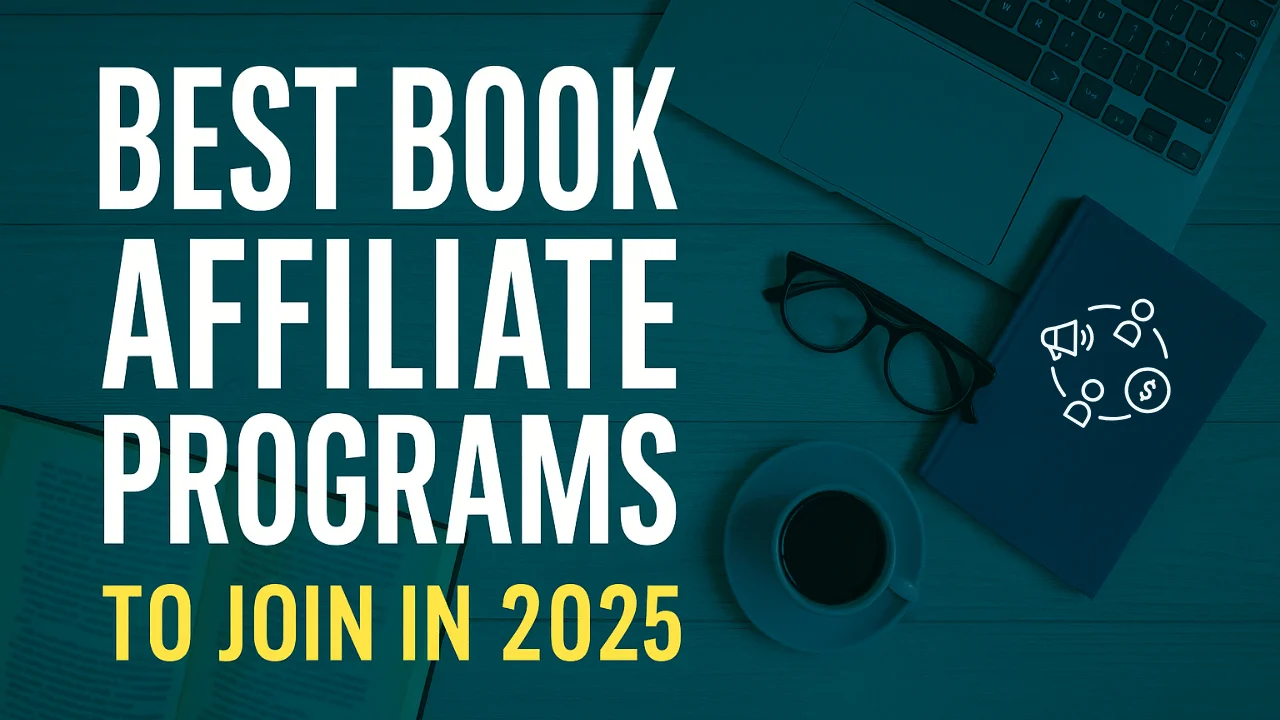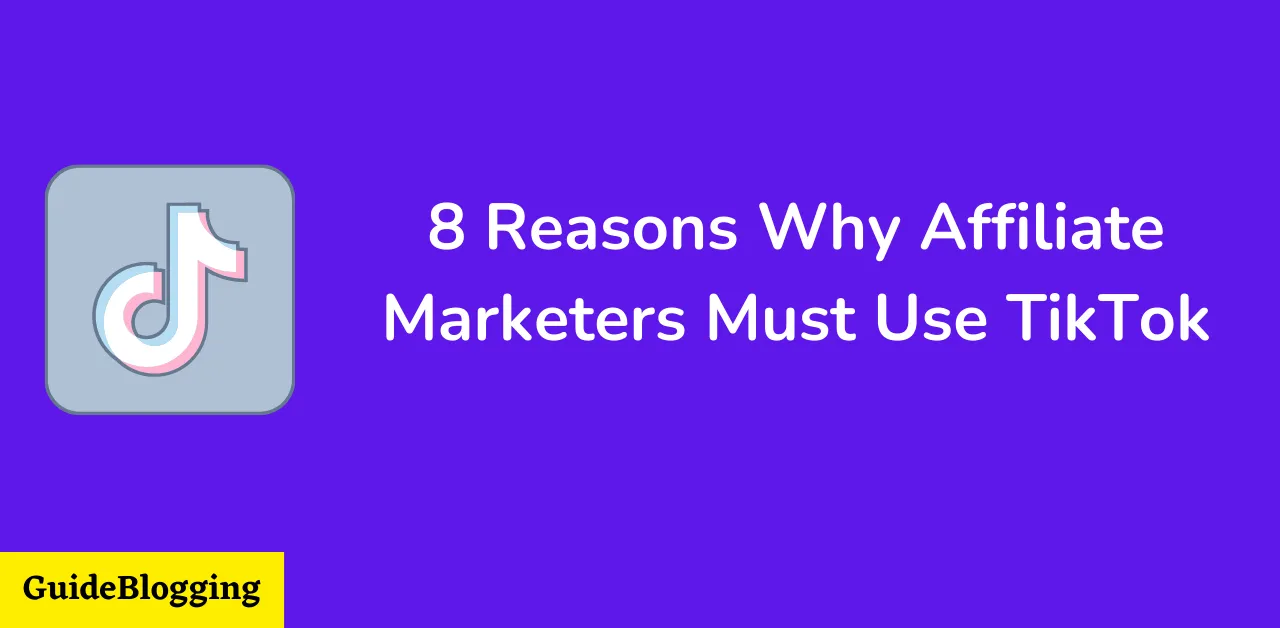If you’re looking to monetise your blog, YouTube channel, or niche website, book affiliate programs are one of the most accessible ways to generate recurring commissions in 2025.
With the global demand for eBooks, audiobooks, and educational resources rising, promoting books has never been more profitable.
Whether you’re targeting academic readers, casual bookworms, or digital learning enthusiasts, there’s a program that fits your niche perfectly.
This guide will walk you through the best book affiliate programs available this year, how they work, and how to choose the right one to start earning passively.
By joining the right affiliate platforms, you can turn your passion for books into a consistent stream of income.
Table Of Contents
What Are Book Affiliate Programs and How Do They Work?
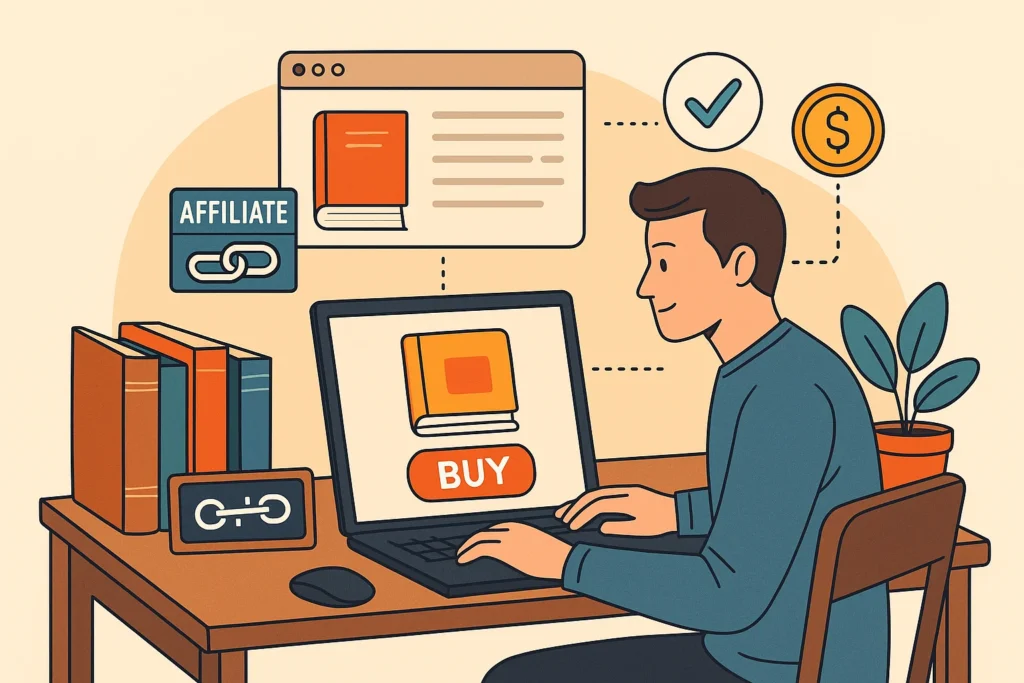
Book affiliate programs are a form of affiliate marketing where you earn a commission by referring people to buy books whether digital, audio, or physical through a unique affiliate link.
Once someone clicks your link and makes a purchase, you receive a percentage of the sale, depending on the program’s commission structure.
These programs are hosted by large online bookstores, publishing networks, or even individual author platforms.
Popular examples include Amazon Associates, Bookshop.org, and BiggerPuffs.
Here’s how the process typically works:
- You sign up for a book affiliate program.
- You receive unique affiliate links to promote specific books or categories.
- When a visitor clicks your link and makes a purchase, you earn a commission.
- The purchase is tracked using browser cookies, often valid for a period ranging from 24 hours to 90 days (cookie duration)
- You get paid according to the program’s payout threshold and schedule.
Book affiliate programs offer a diverse product range. You can promote:
- eBooks via platforms like Kobo or Google Play Books
- Audiobooks through programs like Audible or Chirp Books
- Textbooks through sites like eCampus and VitalSource
- Traditional print books from retailers like Barnes & Noble or Books-A-Million
Whether you’re writing review articles, running a newsletter, or sharing curated lists on social media, these programs integrate seamlessly into your content strategy.
Why Promote Book Affiliate Programs in 2025?

With content consumption growing across digital platforms, book affiliate programs present one of the most consistent and scalable monetisation opportunities for creators, bloggers, and influencers in 2025.
Whether you run a niche book blog, YouTube review channel, or self-publishing platform, promoting books can generate passive income while adding real value to your audience.
1. Monetisation That Matches Your Passion
If you love reading or writing about books, promoting them doesn’t feel like hard selling.
These affiliate programs let you monetise naturally by sharing recommendations, curated reading lists, or honest reviews.
Readers searching for book suggestions already have high buyer intent, which means your conversion rate can outperform many traditional affiliate niches.
Book affiliate marketing also ties in nicely with niche blogging, allowing creators to focus on specific genres like fiction, self-help, academic resources, or audiobooks.
This niche alignment builds trust and helps boost your affiliate sales through audience relevance.
2. Global Reach, Recurring Commissions
Most book affiliate programs operate through platforms that ship globally or offer digital content.
Platforms like Scribd, Kobo, and Book Depository allow affiliates to earn from a worldwide audience rather than just a local one.
For digital products like eBooks and audiobooks, the scalability is even higher since there’s no inventory, shipping, or customer service involved.
Some programs, like Audible, offer recurring commissions, meaning you continue earning as long as the user keeps their subscription active.
This turns book affiliate marketing into a long-term self-publishing income opportunity for content creators and authors alike.
3. Simple to Integrate into Your Existing Content
If you’re already creating book-related content, affiliate links are easy to insert. You can place them in:
- Book reviews
- Reading lists (e.g., “Best Self-Help Books for 2025”)
- Author spotlights
- Genre-specific recommendations
Because book content aligns so closely with searcher intent, integrating these links rarely feels forced.
Readers are looking for suggestions, and you’re helping them decide while getting rewarded.
4. Ideal for Beginners and Micro-Influencers
Many free book affiliate programs have low entry barriers, with no minimum audience size or complicated approval process.
That makes them ideal for new bloggers, self-published authors, Instagram reviewers, or even Pinterest users building book-themed boards.
If you’re building a reading community platform or targeting a literary niche, book affiliate programs offer a sustainable way to grow both your audience and your income.
21+ Best Book Affiliate Programs to Explore in 2025
Choosing the right book affiliate program is key to generating long-term, scalable income.
Whether you’re targeting physical books, academic textbooks, or audiobooks, each affiliate platform offers its strengths, from higher commission rates to broader reach and specialised niches.
Below, you’ll find detailed overviews of top-performing books’ affiliate programs, each suited to different content styles and audience types, that you can join in 2025.
All programs included offer transparent commission structures, global access, and integration with common content strategies like listicles, review-based blogging, or niche product pages.
1. Amazon Associates
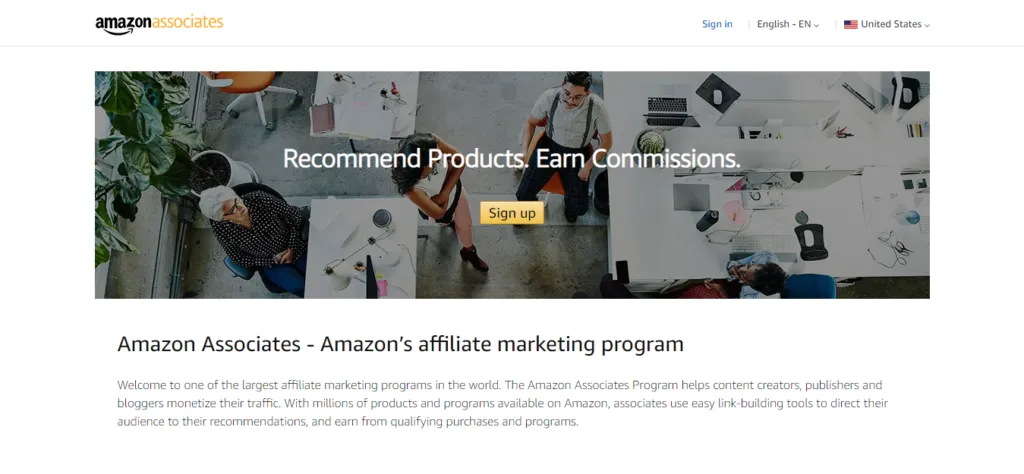
What it Offers:
Amazon Associates is one of the most versatile and widely used book affiliate programs available.
It allows you to earn from all types of books listed on Amazon, including print books, Kindle eBooks, and Audible audiobooks.
Commission Rate:
Typically 4.5% for physical books and up to $15 per Audible bounty for new signups.
Cookie Duration:
24 hours (but any qualifying purchase, not just the book, earns you a commission).
Unique Feature:
High conversion rates due to Amazon’s trust factor, massive selection, and additional cart items that boost your total affiliate revenue.
Great for review-based content and affiliate marketing books roundups.
Best For:
Beginners, niche bloggers, YouTubers, and email newsletters featuring curated reading lists.
2. BiggerBooks Affiliate Program
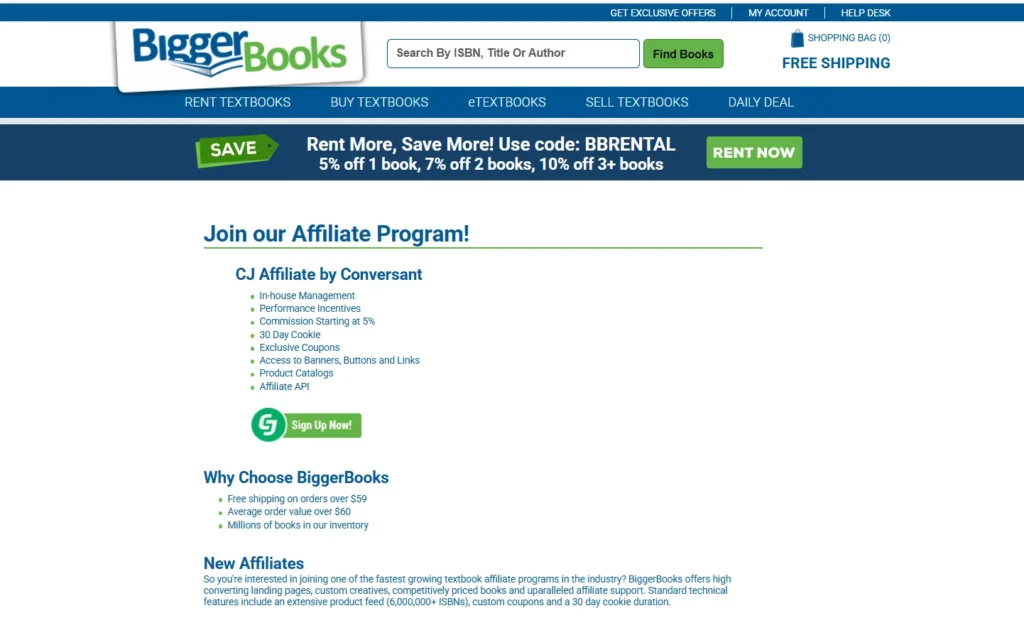
What it Offers:
BiggerBooks specialises in discounted textbooks, eTextbooks, and student-focused learning materials, making it ideal for blogs targeting college students, educators, and academic resources.
Commission Rate:
Up to 10% per sale, which is among the highest in the textbook affiliate program niche.
Cookie Duration:
45 days—offering a longer window for student buyers to convert.
Unique Feature:
Their intense focus on affordability and textbook rentals makes them attractive during back-to-school seasons and mid-year term refreshes.
Best For:
Educational blogs, niche blogging in student life, scholarship sites, and academic influencers.
3. Barnes & Noble
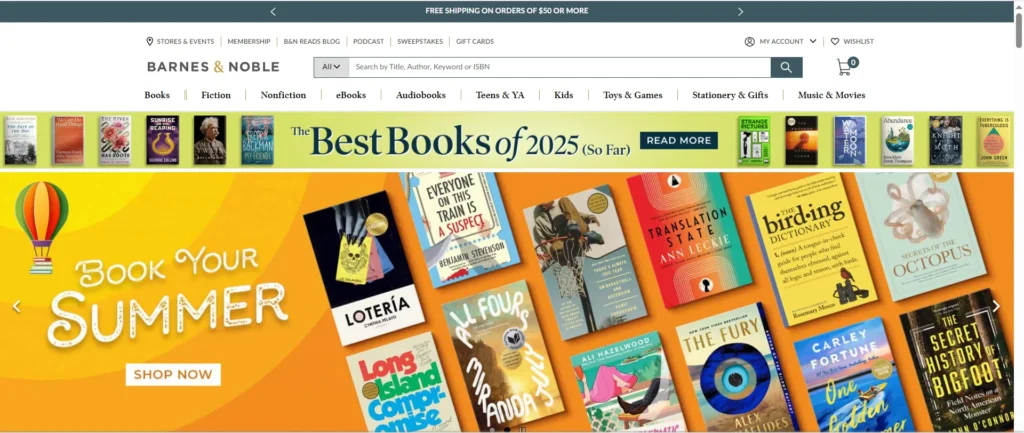
What it Offers:
Barnes & Noble is one of the oldest and most trusted online bookstores. It has a strong brand reputation and a massive catalog of physical books, eBooks, and even educational tools.
Their affiliate program gives access to exclusive promotions and niche book categories like fiction, non-fiction, academic texts, and children’s books.
Commission Rate:
Earn up to 5% per sale, occasionally higher during seasonal promotions and specific categories.
Cookie Duration:
30 days, giving affiliates more time to earn commissions from readers who take time to decide.
Unique Feature:
It’s an ideal alternative to Amazon for bloggers looking to diversify.
Plus, they often run book bundles, membership offers, and niche editorial picks that convert well with curated content strategies.
Best For:
Lifestyle bloggers, literary influencers, educators, and anyone promoting affiliate marketing books or genre-specific lists.
4. Scribd
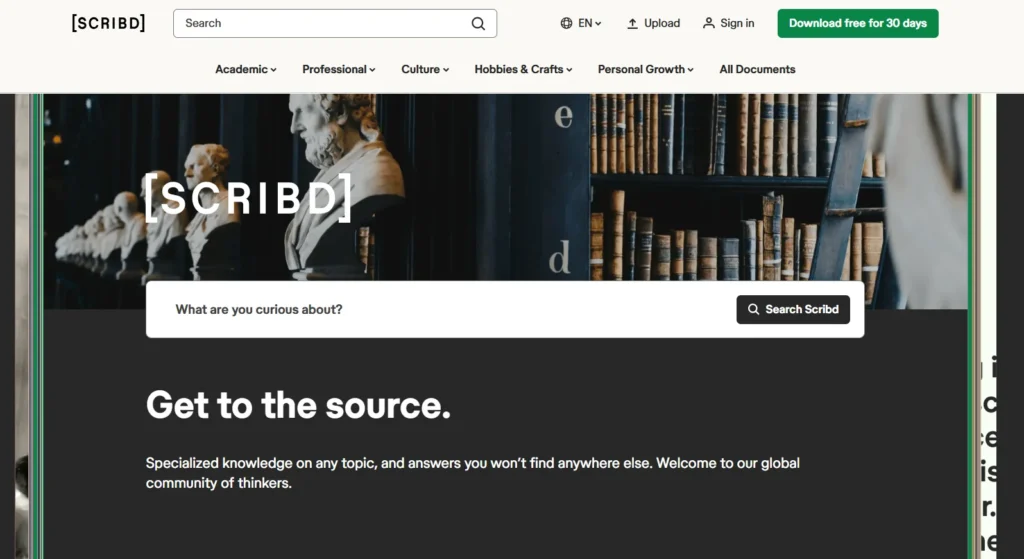
What it Offers:
Scribd is a leading subscription-based reading platform offering unlimited access to eBooks, audiobooks, academic documents, magazines, and sheet music.
With over a million titles, it’s especially valuable for creators promoting digital book affiliate marketing.
Commission Rate:
Typically, the fee is $10 to $12 per referral. The program also includes free trials, making it easier to convert users.
Cookie Duration:
30 days for referral attribution.
Unique Feature:
Since it operates on a subscription model, Scribd affiliates can market recurring value instead of one-time purchases.
Readers often stay for months, allowing you to promote it as a passive income from books solution.
Best For:
Niche bloggers focused on education, productivity, or curated book content.
Ideal for those running email sequences or content-rich funnels around affiliate marketing for books.
5. Book Depository
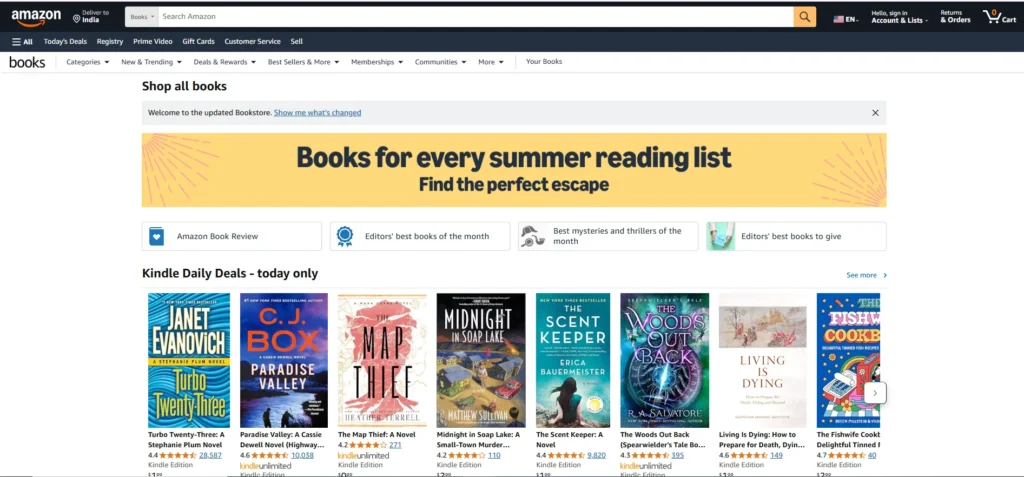
What it Offers:
Book Depository is a global online book retailer known for its free worldwide shipping on millions of print book titles.
As part of the Amazon group, it caters to international audiences who may not have access to regional bookstores.
Its broad appeal makes it a popular choice in book affiliate programs targeting non-US traffic.
Commission Rate:
Up to 5% per sale, depending on product category and location.
Cookie Duration:
30 days.
Unique Feature:
Its global shipping capabilities allow affiliates to earn commissions from almost any country.
This is especially valuable for bloggers with an international readership or those working in niches like travel, education, or global literature.
Best For:
Travel bloggers, international book reviewers, or niche sites focused on classic and academic literature.
6. Kobo
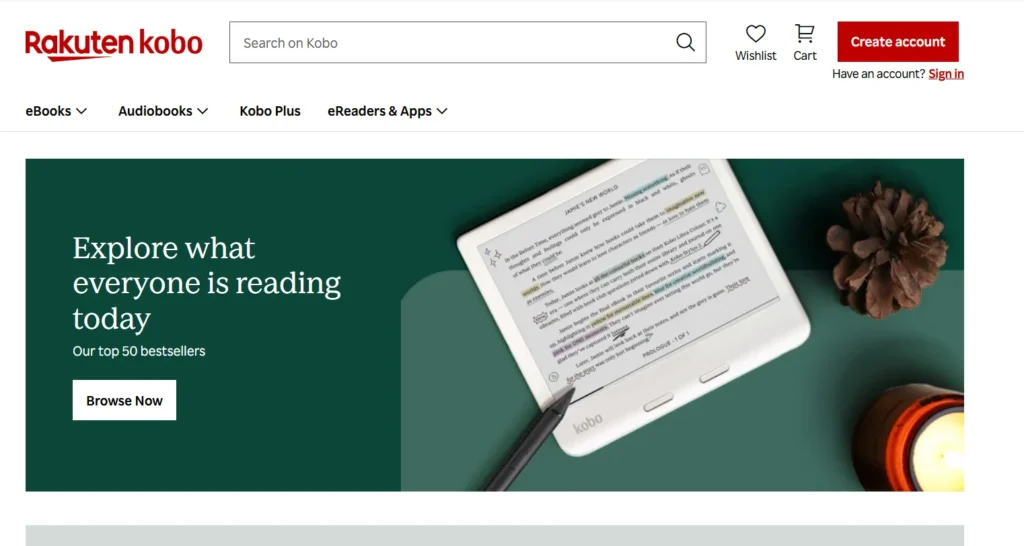
What it Offers:
Kobo is one of the leading platforms for digital books and audiobooks, competing directly with Kindle and Audible.
Their affiliate program lets you earn commissions from sales of individual eBooks or audiobooks and subscriptions to Kobo Plus, their all-you-can-read model.
Commission Rate:
Up to 6% on eBook sales and 10% on subscription signups.
Cookie Duration:
30 days.
Unique Feature:
Kobo supports multiple languages, currencies, and regional storefronts, making it ideal for global promotion.
It’s also a strong alternative for affiliates targeting readers outside the Kindle ecosystem or in non-English-speaking countries.
Best For:
Affiliate marketers focused on digital readers, multilingual blogs, and subscription-based content monetisation.
7. Audible
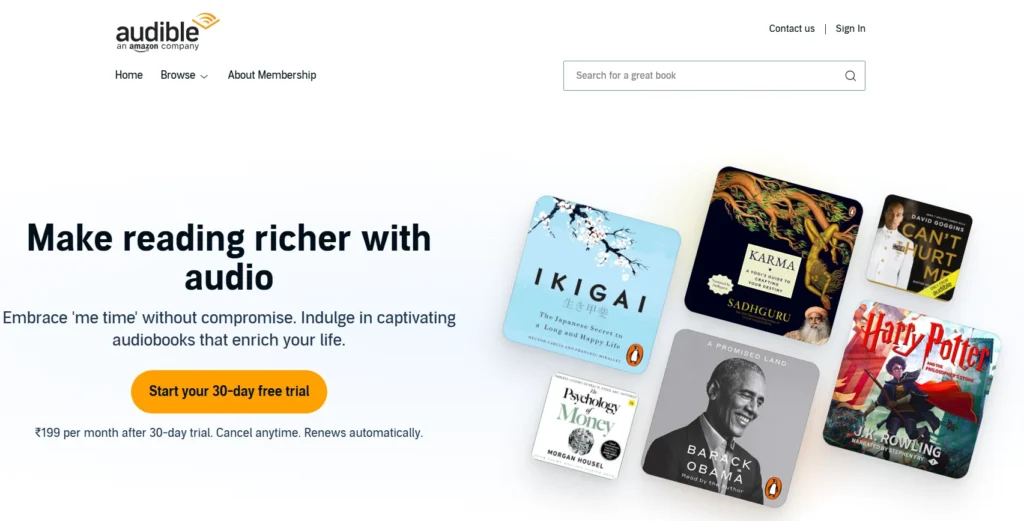
What it Offers:
Audible is one of Amazon’s top audiobook platforms, offering an extensive catalog of audiobooks, original podcasts, and educational content.
The Audible affiliate program is among the most lucrative in the book affiliate marketing space due to its recurring income model and high user retention.
Commission Rate:
Earn $15 per free trial signup and recurring commissions when users convert into paid members.
Cookie Duration:
30 days.
Unique Feature:
Audible’s subscription-based nature allows affiliates to build passive income from books.
Since users often remain subscribed for months, a single conversion can yield ongoing revenue.
Best For:
Podcast creators, YouTubers, personal development bloggers, and reading list curators are targeting audiobook listeners.
8. Apple Books
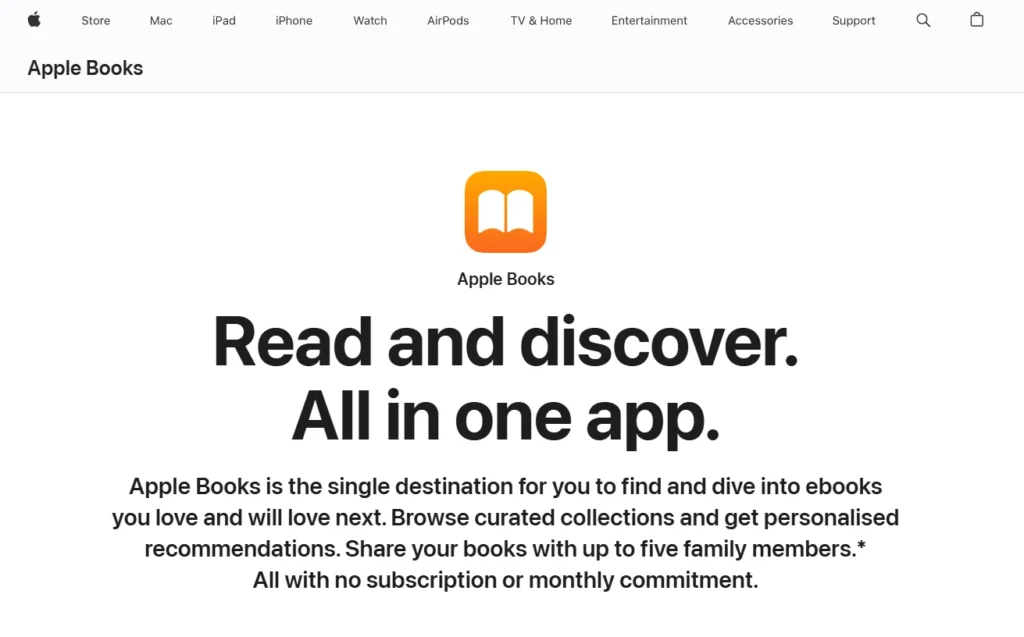
What it Offers:
Apple Books is Apple’s official eBook and audiobook storefront, integrated across iOS and macOS devices.
Through the Apple Services Performance Partner Program (via Partnerize), affiliates can promote a vast range of digital books and earn a percentage of every purchase.
Commission Rate:
Up to 7% per sale of eBooks and audiobooks.
Cookie Duration:
24 hours.
Unique Feature:
Built directly into Apple’s ecosystem, Apple Books has a loyal and tech-savvy user base.
It’s a powerful option for affiliates targeting iPhone, iPad, and Mac users seeking premium book content.
Best For:
Tech-focused bloggers, Apple product reviewers, lifestyle creators, and those curating lists of premium or design-forward book content.
9. Google Play Books
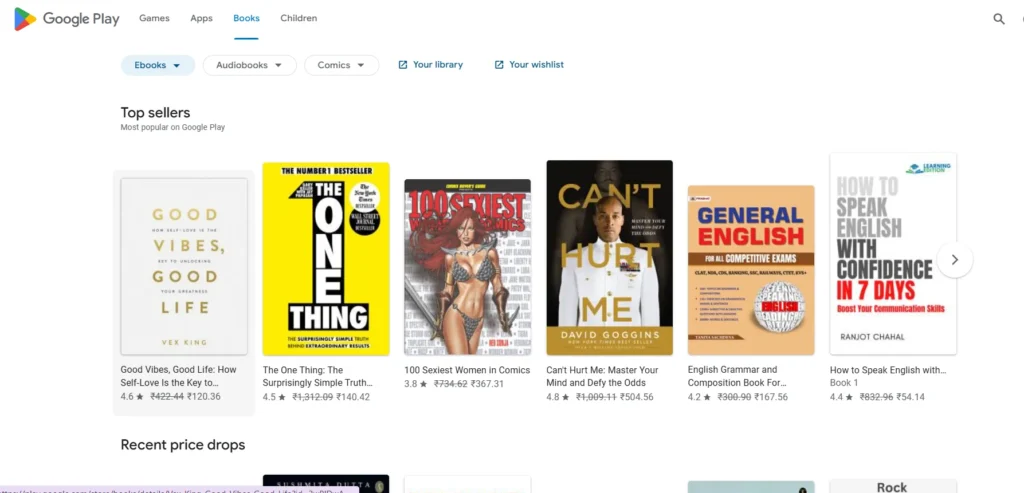
What it Offers:
Google Play Books is a powerful platform within the Android ecosystem, offering millions of eBooks and audiobooks in various languages and genres.
It serves as Google’s official reading platform and is available in over 75 countries. Affiliates can monetise book recommendations by promoting titles via the Google Play Affiliate Program.
Commission Rate:
Generally up to 7% per sale of eligible content.
Cookie Duration:
24 hours.
Unique Feature:
Seamlessly integrates with Android and Google Chrome, making it ideal for bloggers or creators targeting tech-savvy users and mobile readers.
The catalog supports educational, niche fiction, and business books, allowing for easy alignment with affiliate marketing for book content.
Best For:
Tech blogs, education blogs, Android-centric influencers, and SEO-driven book recommendation engines.
10. ThriftBooks
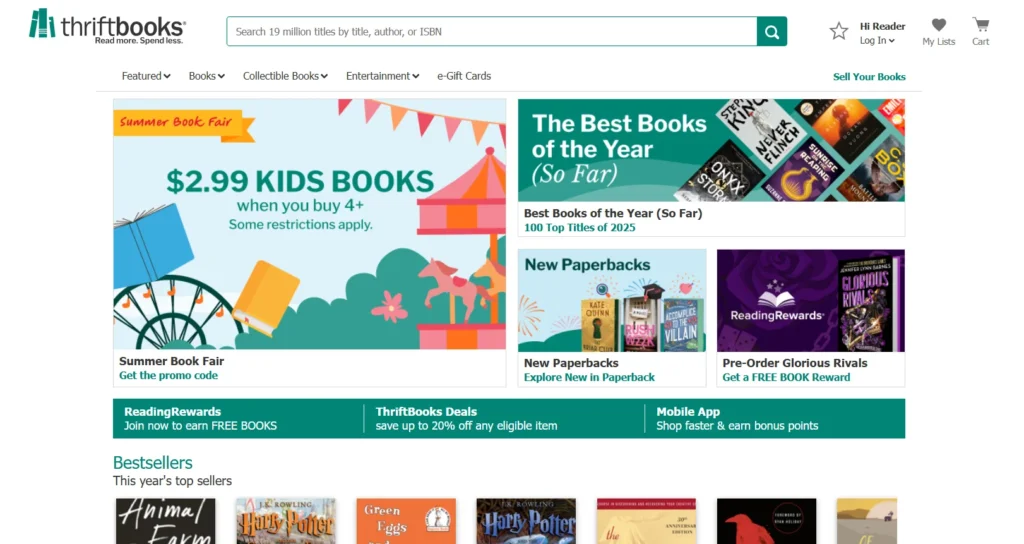
What it Offers:
ThriftBooks is one of the largest independent sellers of used and new books online, offering heavily discounted prices across nearly every genre.
It’s ideal for affiliate marketers focused on affordability, sustainability, and bookseller partnerships.
Commission Rate:
Up to 8% per sale.
Cookie Duration:
30 days.
Unique Feature:
A strong value-driven pitch: affordable books for budget-conscious readers.
ThriftBooks also offers loyalty rewards and frequent promotions, helping affiliates boost conversion rates.
Best For:
Budget blogs, sustainability content creators, parenting and homeschooling blogs, and literary influencers looking to promote free or low-cost book affiliate programs.
11. Books-A-Million
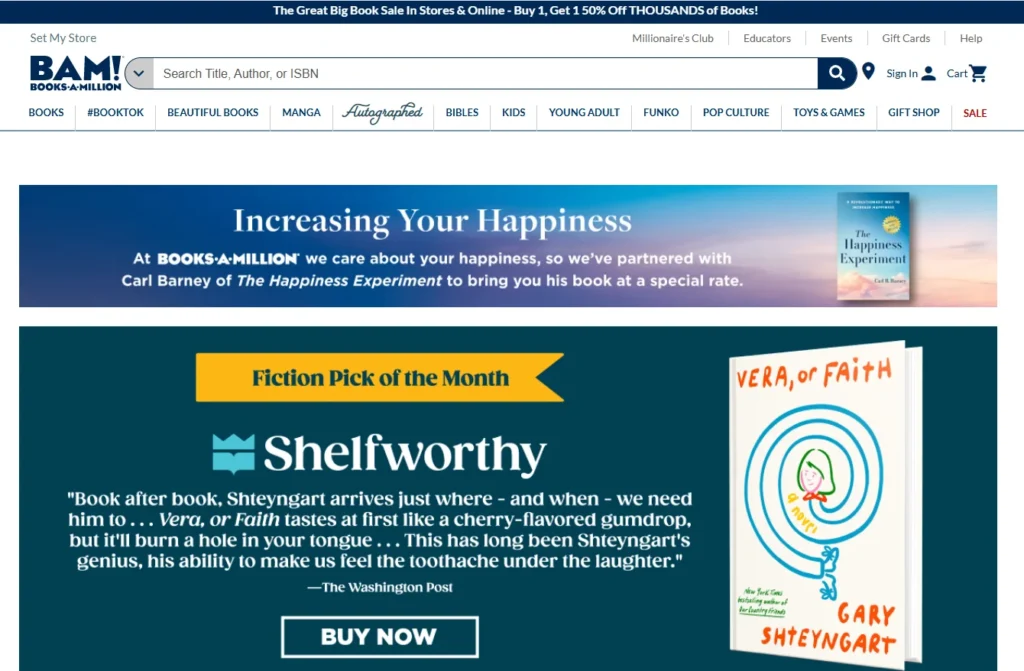
What it Offers:
Books-A-Million (BAM) is a well-established American bookstore chain offering a wide range of products, including physical books, eBooks, collectables, toys, and educational tools.
Their affiliate program allows content creators to earn by promoting popular titles across multiple categories, including fiction, children’s books, religion, and history.
Commission Rate:
Up to 6% per sale on eligible items.
Cookie Duration:
30 days.
Unique Feature:
Books-A-Million regularly runs sitewide promotions, seasonal campaigns, and featured book spotlights that affiliates can leverage.
Its brand reputation and broad inventory make it a strong alternative to Amazon for bloggers seeking diversification within book affiliate programs.
Best For:
U.S.-based lifestyle bloggers, education sites, and review-based content creators covering trending books or gift guides.
12. Bookshop.org
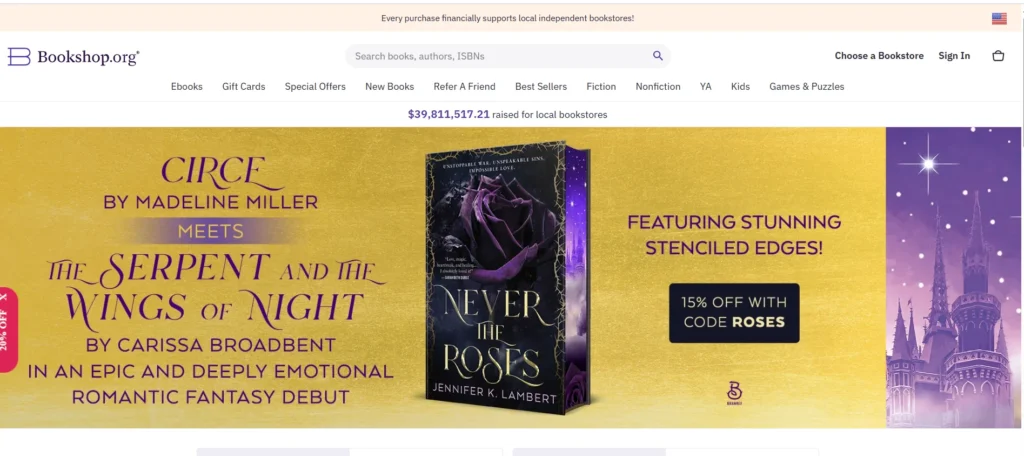
What it Offers:
Bookshop.org is a socially conscious bookstore affiliate program that supports independent bookstores with every purchase.
It offers affiliates a chance to earn commission while contributing to local businesses, making it appealing for bloggers and creators with an ethical or community-focused brand.
Commission Rate:
10% per referred sale (plus a portion of the overall profit goes to local bookstores).
Cookie Duration:
The affiliate cookie duration is 30 days.
Unique Feature:
Affiliates can create custom storefronts showcasing their recommended titles. This feature is ideal for curated book lists, niche book clubs, and creators who promote reading with purpose.
Best For:
Niche blogging in education, ethical consumerism, or literature. Also well-suited for authors, writing coaches, and advocacy-based content platforms.
13. eCampus.com
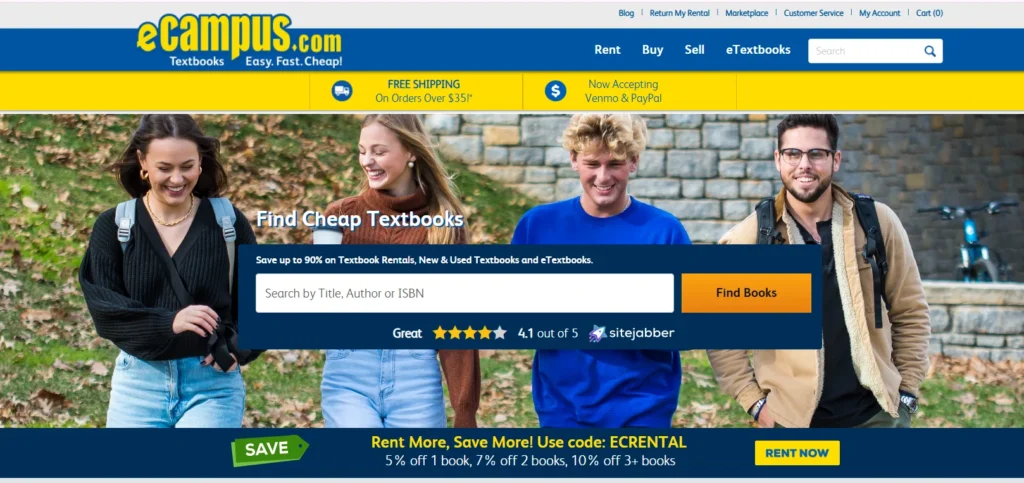
What it Offers:
eCampus.com is one of the top platforms in the textbook affiliate program space, offering new, used, rental, and digital textbooks for students across academic disciplines.
The platform caters specifically to the education sector and operates one of the most structured affiliate programs for books in higher education.
Commission Rate:
Earn up to 8% per sale for physical books and up to 10% on eTextbooks and rentals.
Cookie Duration:
45 days — providing affiliates an extended window to earn, especially helpful during school enrollment periods.
Unique Feature:
In addition to a wide inventory, eCampus.com has seasonal marketing kits for affiliates (e.g., Back to School, Semester Rentals) and supports bulk affiliate tools for larger educational platforms.
Best For:
Student blogs, scholarship platforms, tutoring services, college survival content creators, and academic influencers.
14. TextbookX
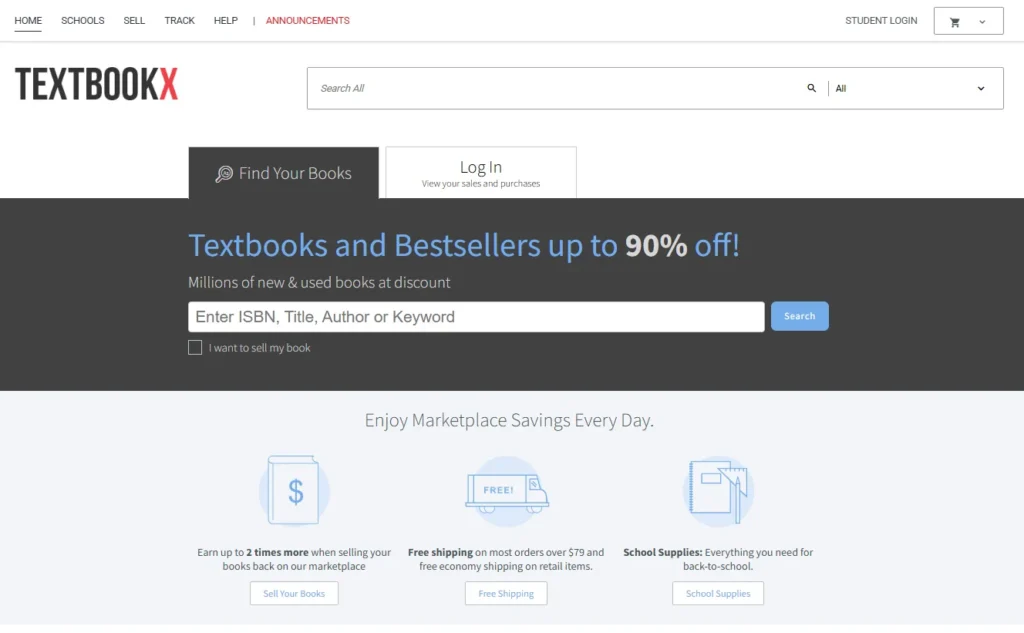
What it Offers:
TextbookX is a powerful platform for buying, selling, and renting academic books.
Operated by Akademos, it partners with hundreds of colleges and universities, making it a valuable option for affiliates targeting the scholarly and higher education sector.
Commission Rate:
Commissions range up to 6% on eligible sales. Custom partnership options are available for institutions or education-focused brands.
Cookie Duration:
30 days.
Unique Feature:
TextbookX specialises in institutional integration, which allows affiliates in the education niche to promote official course materials with real-time pricing.
It’s perfect for bloggers involved in academic affiliate marketing or content tailored to student success.
Best For:
Higher education bloggers, EdTech influencers, student loan help platforms, or creators offering guides on affordable education.
15. VitalSource
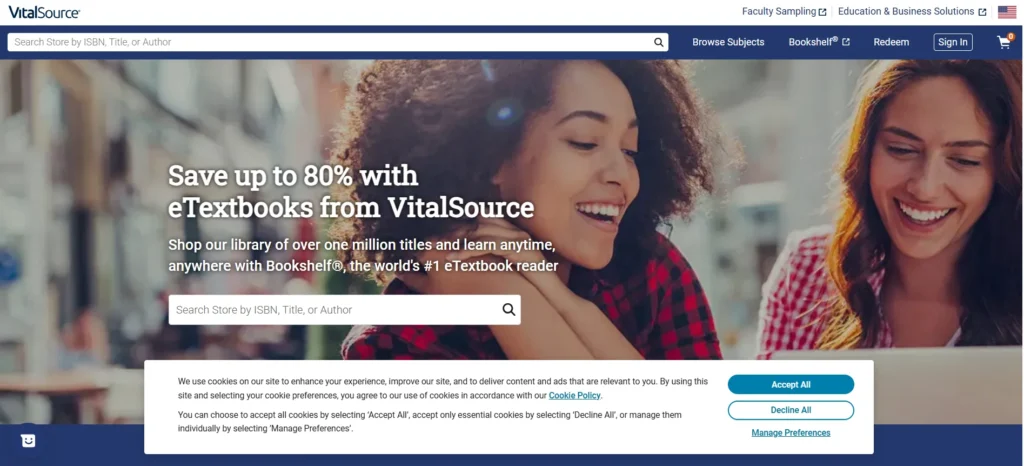
What it Offers:
VitalSource is a leading platform in the digital textbook space, offering eTextbooks for higher education, K–12, and professional development.
Its affiliate program is ideal for promoting digital-first content to students, educators, and self-learners.
Known for its ease of access and global reach, VitalSource enables affiliates to earn by recommending flexible and portable learning solutions.
Commission Rate:
Up to 8% per sale, robust on eTextbooks and bundled learning resources.
Cookie Duration:
30 days.
Unique Feature:
VitalSource supports bulk purchases and DRM-protected eBooks and integrates well with EdTech platforms, making it a scalable option for academic affiliate marketing.
As more institutions shift to digital formats, this platform will become increasingly relevant in 2025.
Best For:
Educational bloggers, college survival guides, instructional designers, and self-paced learning sites promote digital book affiliate marketing.
16. Second Sale
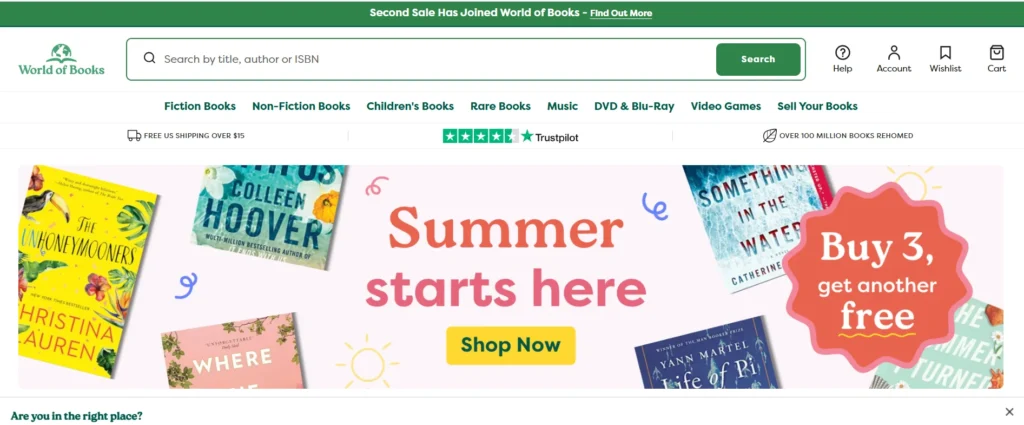
What it Offers:
Second Sale is a discount book marketplace specialising in gently used books across genres, from fiction and biographies to textbooks and rare finds.
The platform focuses on affordability, making it an excellent fit for budget-conscious audiences.
Commission Rate:
Up to 7% per sale.
Cookie Duration:
30 days.
Unique Feature:
Second Sale offers competitively low pricing and a massive selection of secondhand titles.
It adds value to affiliates who want to promote sustainable reading habits by repurposing used books while still generating solid affiliate commissions.
Best For:
Budget bloggers, minimalist content creators, homeschooling resources, and eco-conscious readers focused on book seller partnerships and free book affiliate programs.
17. Calendar Club

What it Offers:
Calendar Club is a niche retailer offering calendars, planners, and book-related gifts, including activity books, puzzles, and themed reading accessories.
While not a traditional book affiliate program, it complements book content by offering seasonal and evergreen items that align with literary or organisational themes.
Commission Rate:
Typically up to 10% per sale on eligible products.
Cookie Duration:
30 days.
Unique Feature:
Calendar Club is an excellent upsell for book bloggers or influencers building gift guides, reading habit resources, or literary niche monetisation strategies.
Their products appeal to readers, planners, and collectors, especially during the holiday season.
Best For:
Lifestyle bloggers, planners, productivity creators, gift list curators, and bloggers building affiliate marketing for book content with a seasonal or companion product twist.
18. Bookroo
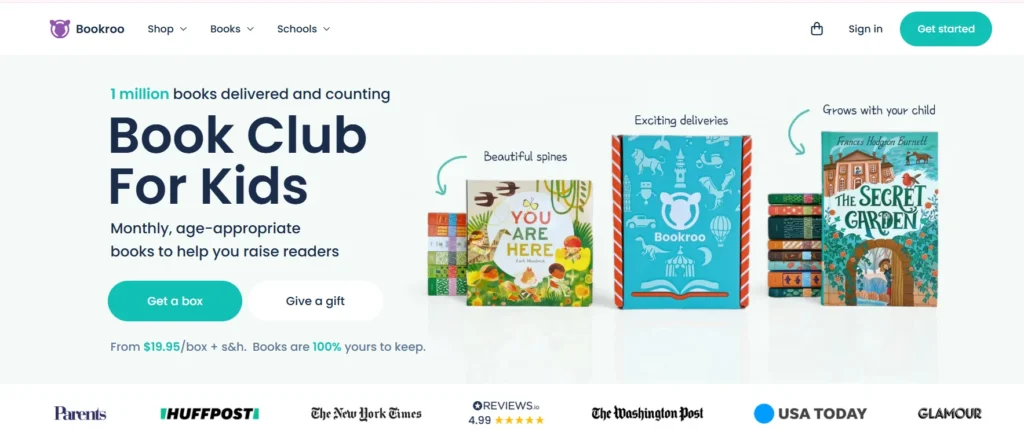
What it Offers:
Bookroo is a children’s book subscription box designed to encourage reading habits from an early age. Each month, subscribers receive curated picture books or early readers depending on their child’s age.
Their affiliate program for books is perfect for parenting influencers and educational content creators.
Commission Rate:
Earn $5–$10 per referred subscriber. Some promotions may offer a percentage per order.
Cookie Duration:
30 days.
Unique Feature:
As a subscription-based model, Bookroo introduces recurring commission potential while aligning with the values of education, literacy, and family engagement.
It’s particularly effective when used in long-form blog post, newsletters, or social media reels aimed at parents and teachers.
Best For:
Mom bloggers, homeschooling sites, parenting coaches, and influencers focused on early childhood education and book discovery.
19. Premier Collectables
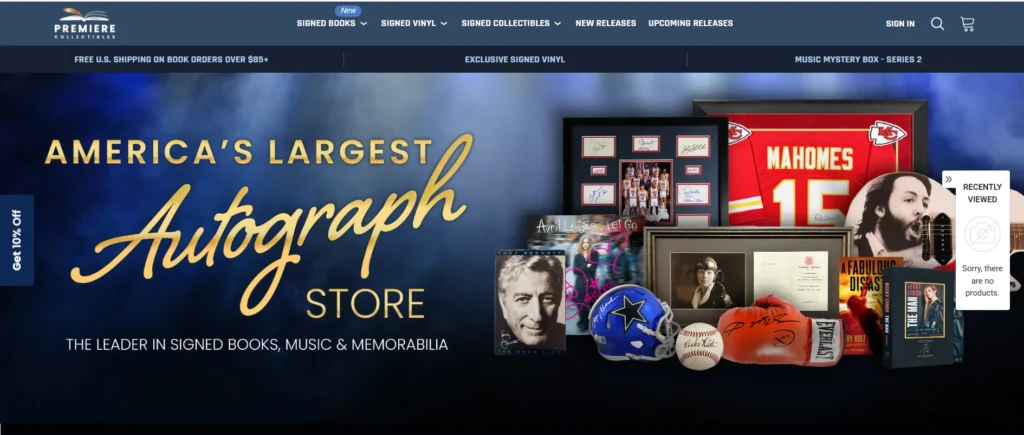
What it Offers:
Premier Collectables is a speciality platform that sells signed editions of books, particularly by bestselling authors, celebrities, and public figures.
It provides affiliates with a unique opportunity to promote high-value, exclusive literary products to passionate readers and collectors.
Commission Rate:
Typically 10% per sale on eligible orders.
Cookie Duration:
30 days.
Unique Feature:
Unlike traditional book affiliate programs, Premier Collectables offers signed books with limited availability, which creates urgency and exclusivity, perfect for email-driven campaigns and time-sensitive promotions.
Best For:
Author-focused bloggers, book reviewers, gift list creators, and affiliates targeting fans of exclusive or collectable editions.
20. Eagle Saver
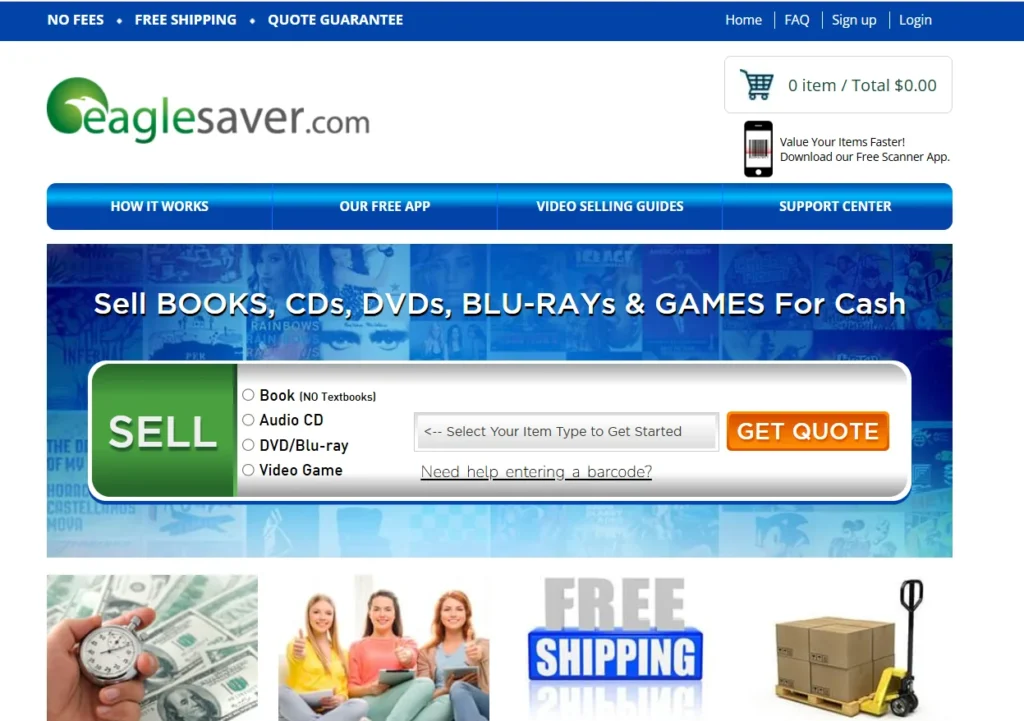
What it Offers:
Eagle Saver is a buyback and resale platform where users can sell and buy used books, DVDs, CDs, and textbooks.
Their affiliate program supports traffic focused on secondhand goods and sustainable shopping habits.
Commission Rate:
Up to 5–8% per sale, depending on category.
Cookie Duration:
30 days.
Unique Feature:
Affiliates can promote both the buying and selling side of the platform, offering dual monetisation potential. It’s beneficial for student-focused blogs that cover cost-saving strategies and textbook reuse.
Best For:
College resource blogs, frugal living creators, sustainability-focused influencers, and book affiliate marketing sites targeting used books and resellers.
21. Chirp Books
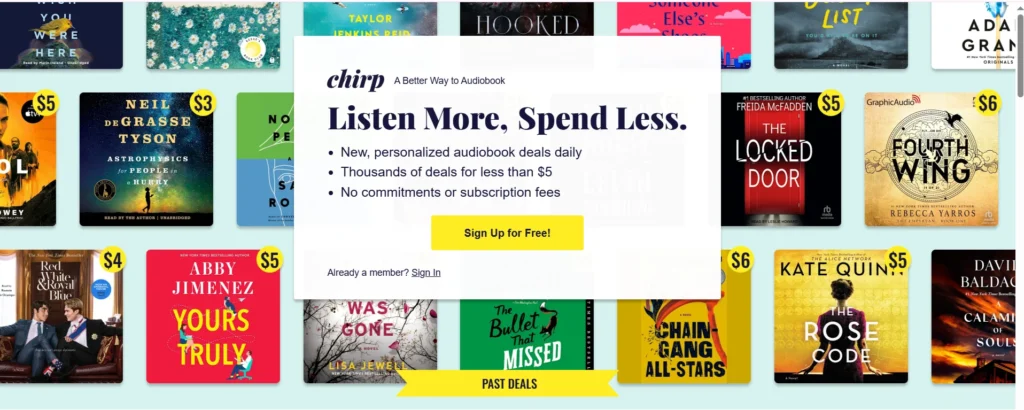
What it Offers:
Chirp Books is a discount audiobook platform offering deeply reduced prices without subscriptions.
Unlike Audible or Scribd, users can buy audiobooks à la carte—no commitment required.
Their affiliate program gives you access to a library of genre-rich, affordable audiobooks.
Commission Rate:
Typically $5–$10 per referred customer, or a percentage of sales during special promotions.
Cookie Duration:
14 to 30 days (based on promotional structure).
Unique Feature:
Chirp Books is perfect for budget-conscious readers who enjoy audiobooks without the monthly subscription cost.
Its unique model fills a gap in the digital book affiliate marketing space, offering a lower barrier to entry.
Best For:
Audiobook bloggers, personal development sites, fiction reviewers, and affiliates are looking for alternatives to Audible.
How to Choose the Right Book Affiliate Program for Your Blog or Niche?
Choosing the right book affiliate program isn’t just about selecting the one with the highest commission.
It’s about aligning with your audience’s interests, your content style, and your long-term monetisation strategy.
Whether you’re creating content for students, casual readers, audiobook listeners, or authors, the program you choose should support seamless integration and measurable results.
1. Identify Your Target Audience First
Start by understanding who you’re speaking to.
If your readers are college students, textbook platforms like BiggerBooks, eCampus, or TextbookX may convert well.
If you cater to audiobook fans, platforms like Audible and Chirp Books are better suited. For general readers, Amazon Associates, Barnes & Noble, or Bookshop.org may offer more versatility.
Your niche defines which affiliate ecosystem performs best. This is why niche book affiliate programs often deliver higher relevance and trust, which directly improves your conversion rate.
2. Evaluate the Commission Structure
Affiliate programs typically offer either flat-rate or percentage-based commissions.
Some offer recurring commissions on subscriptions, as seen with Audible, Scribd, or Bookroo, which can generate ongoing passive income. Others, like Amazon or ThriftBooks, offer a one-time commission per sale.
Choose a structure that aligns with your content model.
If you’re producing evergreen book reviews or listicles, recurring models may offer better lifetime value.
3. Check Cookie Duration and Payment Terms
Cookie duration refers to how long your referral tracking remains active.
Programs with longer durations (30–90 days) offer better opportunities to earn, especially when readers take time to make a purchase.
Look for programs with transparent payment terms, low payout thresholds, and flexible withdrawal options—these factors impact how quickly you see returns.
Platforms like eCampus.com and BiggerBooks offer longer cookie durations, making them appealing for affiliate bloggers in the educational niche.
4. Assess Platform Support and Reputation
Affiliate success often depends on how well a platform supports affiliates. Review the program dashboard.
Does it provide real-time reporting, tracking links, creatives, or seasonal promotions?
The more intuitive and feature-rich the dashboard, the easier it is to manage and optimise your strategy.
Equally important is the brand’s reputation. Affiliating with platforms that readers already trust, like Amazon, Apple Books, or Book Depository, naturally boosts your credibility and increases conversion.
5. Look for Deep Linking and Content Flexibility
Deep linking allows you to link directly to specific titles, genres, or even landing pages.
This is critical if your content includes curated book lists, individual book reviews, or blog series.
Programs that support deep linking like Amazon Associates and Bookshop.org give you the flexibility to drive traffic exactly where it converts best.
Comparing Digital vs Physical Book Affiliate Programs

One of the most important decisions when choosing a book affiliate program is whether to promote digital or physical books.
Each format has distinct advantages depending on your niche, content style, and target audience.
Understanding how these models differ in delivery, pricing, and earning potential will help you align your affiliate strategy with long-term revenue goals.
1. Delivery Models and Global Reach
Digital book affiliate marketing allows readers to access content instantly. Platforms like Scribd, Google Play Books, and Kobo deliver eBooks and audiobooks across devices with zero shipping delays.
This makes digital affiliate programs ideal for global audiences, especially in countries where access to physical books is limited or delayed by international shipping costs.
In contrast, physical book programs like Barnes & Noble or ThriftBooks rely on traditional shipping, which may limit your earning potential with non-local traffic.
However, physical platforms still appeal strongly to audiences who prefer tangible books or enjoy collecting hardcover editions.
2. Pricing Flexibility and Commission Margins
Digital book platforms often allow for higher margins. Since there are no printing or distribution costs, publishers and affiliate networks can afford to offer better payouts.
For example, Scribd’s subscription model provides recurring commissions, while platforms like Audible offer fixed bounties for free trials—both of which compound earnings over time.
Physical book retailers typically offer lower commission percentages, and shipping fees may deter some users from completing a purchase.
However, platforms like Book Depository help offset this with free global shipping, which enhances conversion rates on physical sales.
3. Choosing Based on Book Categories and Content Style
If your content leans into eBook sales, productivity guides, or personal development topics, digital platforms are usually more aligned.
They’re ideal for mobile readers, professionals, or international traffic.
If your content centres around curated libraries, gift guides, or literary experiences, physical book programs may perform better.
Barnes & Noble or Premier Collectables are strong candidates for influencers and bloggers who promote special editions, signed books, or themed collections.
International Support: Which Programs Work Worldwide?

For affiliates targeting readers beyond the U.S. or India, choosing book affiliate programs with solid international support is essential.
Shipping zones, payout methods, or content restrictions limit many programs.
However, a number of platforms offer global accessibility through digital distribution or international fulfilment, making it easier to monetise traffic from multiple regions.
1. Programs with Global Shipping Coverage
Book Depository is one of the most reliable options for affiliates focused on print books and international audiences.
It ships to over 160 countries with free delivery, which helps reduce cart abandonment due to high shipping costs.
This makes it ideal for content creators in countries where Amazon or Barnes & Noble may have logistical restrictions.
Kobo is another strong contender. It offers eBooks and audiobooks and has storefronts customised by country, currency, and language.
This ensures your affiliate links remain relevant to regional users without having to maintain multiple versions of your content.
2. Digital Programs Without Shipping Barriers
Affiliates in regions with limited physical shipping coverage can benefit from online book affiliate marketing platforms like Scribd, Audible, and Google Play Books.
These programs distribute digital content instantly, bypassing all shipping and import limitations.
That’s not only convenient for users, but also increases your potential conversion rate since readers can begin consuming content immediately.
Because digital products like eBooks and audiobooks require no physical inventory, you’ll also avoid limitations tied to stock, location, or delivery delays.
This makes these programs ideal for non-U.S. bloggers or creators working in emerging markets.
3. Language, Currency, and Global Platform Support
Some platforms offer multi-language and multi-currency support, which is crucial for creators targeting multilingual audiences.
For instance, Kobo and Google Play Books support local currencies and localised catalogues, improving user experience and boosting your credibility with international readers.
Additionally, platforms like Amazon Associates have localised programs for several countries (UK, Canada, India, etc.), although they require account setups for each region.
If you’re serious about reaching a global audience, look for affiliate programs with centralised dashboards and consolidated performance tracking to streamline reporting and optimisation.
How to Write Content That Converts for Book Affiliate Marketing?

Creating content for book affiliate marketing isn’t just about adding affiliate links; it’s about writing strategically to earn trust, clicks, and commissions.
When done well, your content not only informs but also subtly persuades your audience to take action, whether that’s purchasing a title, subscribing to an audiobook platform, or joining a reading community.
Let’s break down how to make your content work harder and convert more effectively.
1. Focus on SEO-Driven Content Formats
Start by choosing content formats that match reader intent and align with review-based content strategy.
Reviews, buying guides, curated reading lists, and comparisons are proven to perform well in book-related niches.
These formats naturally allow you to recommend specific titles, link to relevant programs like Amazon Associates, Bookshop.org, or Audible, and integrate call-to-action (CTA) elements without breaking the user experience.
If your niche is education, create guides like “Best Textbooks for College Freshmen.”
If your audience is into fiction, try genre roundups such as “Top Mystery Novels to Read in 2025.”
In both cases, use book recommendation engines like Goodreads, Google Trends, or even Amazon Bestseller lists to find high-converting titles.
2. Place Keywords and Affiliate Links Naturally
Avoid keyword stuffing or inserting affiliate links out of context. Use long-tail keywords like “best affiliate marketing books for beginners” or “affordable history textbooks online” to blend SEO with relevance.
Anchor your affiliate links naturally within sentences and always ensure that they provide value, not interruption.
Diversify your affiliate destinations. Mix platforms like Barnes & Noble, ThriftBooks, Audible, and Kobo to give users choices and optimise for higher earnings.
3. Optimise Internal Linking and Calls to Action
Use smart internal linking to guide your readers from top-funnel content to bottom-funnel actions.
For example, link a general “Best Books for Remote Workers” article to specific reviews or a page comparing book affiliate programs.
Use clear, actionable CTAs. Instead of “Click here,” try “Get this book on Audible free with a trial” or “Buy the signed edition now at Premier Collectables.”
These are more compelling and set clear expectations.
Also, always meet your affiliate disclosure requirements by adding a short disclaimer near your first link or at the top of your content.
This builds transparency and trust, which directly impacts your conversion rate.
Tools and Plugins for Managing Book Affiliate Links

When promoting book affiliate programs, having the right tools in place to manage your affiliate links is just as important as the content you create.
Without proper tracking, link organisation, and performance data, you could be missing out on commissions and valuable optimisation opportunities.
Thankfully, a variety of WordPress plugins and analytics tools make affiliate link management more efficient, transparent, and conversion-focused.
1. Use WordPress Affiliate Plugins for Link Cloaking and Tracking
If your blog is built on WordPress, tools like ThirstyAffiliates and Pretty Links allow you to cloak long URLs into branded, user-friendly links.
Instead of promoting a messy affiliate link, you can turn it into something clean like:
yourdomain.com/go/audible
These plugins not only improve user experience but also make your links more straightforward to manage and update.
They also integrate with affiliate tracking software, giving you insights into which book titles, affiliate programs, or pages are converting best.
This visibility is essential when running A/B tests or optimising CTA placements based on performance data.
2. Track Performance with Google Analytics UTM Parameters
For deeper insight, use UTM tracking in Google Analytics to monitor traffic sources and behaviours.
Add unique UTM codes to each affiliate link based on campaign, book category, or traffic source (e.g., newsletter, blog post, sidebar).
This helps you understand which content and channels are actually driving clicks and conversions.
You can then refine your strategy by comparing the performance of different book affiliate marketing campaigns, such as a reading list blog post or a curated newsletter.
3. Manage Links from a Centralised Dashboard
As your blog grows and you join more book affiliate programs, managing multiple links manually becomes inefficient.
That’s where a centralised program dashboard becomes essential. Plugins like ThirstyAffiliates offer link categorisation, geolocation targeting, auto-linking, and reporting—all in one place.
This not only streamlines affiliate operations but also ensures you stay compliant with outdated or broken links across your content, for affiliates promoting a mix of platforms like Amazon, Barnes & Noble, Bookshop.org, and Audible, this centralised control prevents missed revenue.
Common Mistakes to Avoid in Book Affiliate Marketing

While promoting book affiliate programs is one of the most accessible ways to earn online, beginners often fall into avoidable traps that limit conversions and damage trust.
By recognising and avoiding these mistakes early, you can build a sustainable affiliate income stream that aligns with your audience’s needs and Google’s quality standards.
1. Promoting Poor-Quality or Irrelevant Books
Your credibility is directly tied to what you promote. While recommending outdated, low-quality, or irrelevant titles may earn a quick click, it damages long-term trust and results in lower conversion rates.
Always curate book selections based on audience interest and genre alignment, whether you’re targeting students, audiobook fans, or niche readers.
Use book recommendation engines and platforms like Goodreads or Amazon reviews to vet your choices before adding them to your content.
When in doubt, select bestsellers or books from trusted publishers to maintain quality and credibility.
2. Ignoring Affiliate Disclosure Requirements
Failing to include proper affiliate disclosures not only violates FTC guidelines but also erodes reader trust.
Every page with affiliate links should clearly disclose that you may earn a commission if a purchase is made through your link.
This is especially important in review-based content, buying guides, and reading list articles.
Place your disclosure near the first affiliate link or as a short notice at the top of the post.
This small step builds transparency and increases user confidence, positively influencing your conversion rate.
3. Skipping Deep Linking Opportunities
Many beginners link to a platform’s homepage instead of directing users to specific books, categories, or landing pages.
This adds friction, forcing users to search on their own and reducing the chance of conversion.
Using deep linking ensures your traffic lands exactly where the recommendation was made be it a single book on Amazon, a genre list on Bookshop.org, or a specific audiobook on Audible.
Programs like Amazon Associates, Kobo, and Book Depository support deep linking and even allow preloaded affiliate parameters, making it easier to control the buyer’s journey.
4. Not Understanding Your Audience’s Interests
Successful affiliates align content with audience targeting.
If you’re writing for college students, they are likely not interested in classic fiction or parenting books.
If your audience follows productivity or entrepreneurship, they’ll be more engaged with affiliate marketing books, business titles, or Audible subscriptions.
Survey your audience, analyse what performs best in Google Search Console, and use that data to guide your book selections.
The better your content matches reader intent, the stronger your engagement and affiliate income.
Final Thoughts
Whether you’re a book blogger, niche content creator, or someone looking to monetise a book blog, affiliate marketing offers a flexible and scalable way to generate consistent revenue.
The rise of digital platforms, global fulfilment, and recurring commission models makes it easier than ever to turn your love for books into passive income.
Throughout this guide, you’ve seen how diverse and rewarding book affiliate programs can be from subscription-based platforms like Scribd and Audible, to trusted giants like Amazon, and niche programs like Bookshop.org and BiggerPuffs.
Whether your audience consists of students, audiobook enthusiasts, or everyday readers, there’s a program that aligns with your content and their needs.
Start by joining one or two trusted affiliate platforms and building your strategy around authentic book recommendations.
Use SEO-driven content, optimise with deep linking, and track performance with tools that help you scale.
Start earning from your blog today the books you love could be the next stream of income for your content business.
FAQs – Book Affiliate Programs in 2025
Are there affiliate programs for books?
Yes, several major retailers, such as Amazon, Kobo, Audible, and Scribd, offer book affiliate programs with competitive commissions.
What are the highest-paying affiliate programs?
Audible, BiggerBooks, and eCampus.com typically offer the most lucrative commission structures, especially on subscriptions and textbooks.
How to become a Booking affiliate?
You can apply through Booking.com’s official affiliate program, but note that it’s focused on travel, not books.
Can I be an Amazon affiliate for books?
Yes. Amazon Associates lets you promote all types of books, including Kindle eBooks, print editions, and Audible audiobooks.
How can I maximise earnings with book affiliate programs in 2025?
Create SEO-optimised content, publish in-demand book lists, use deep linking, and choose programs with recurring commissions or long cookie durations.
Which book affiliate program offers the highest commission rates?
Scribd and Audible offer some of the highest commission rates, often ranging from 30% to 50%, particularly for new subscriptions.
What are the benefits of promoting digital vs physical books?
Digital books allow instant access and global reach, while physical books appeal to collectors and traditional readers.
How does cookie duration impact income?
Longer cookie durations increase your chance of earning from users who return later to make a purchase.
Which programs support international audiences?
Platforms like Kobo, Amazon, and Book Depository offer multi-currency support and global delivery options.
Also Read:
- 10 Best Travel Affiliate Programs 2025 – Make Big Commission
- 19+ Best Gaming Affiliate Programs 2025 – Make Huge Commission In 2025
- 19 Best Music Affiliate Programs Of 2024- Special Picks For Music Blogs
